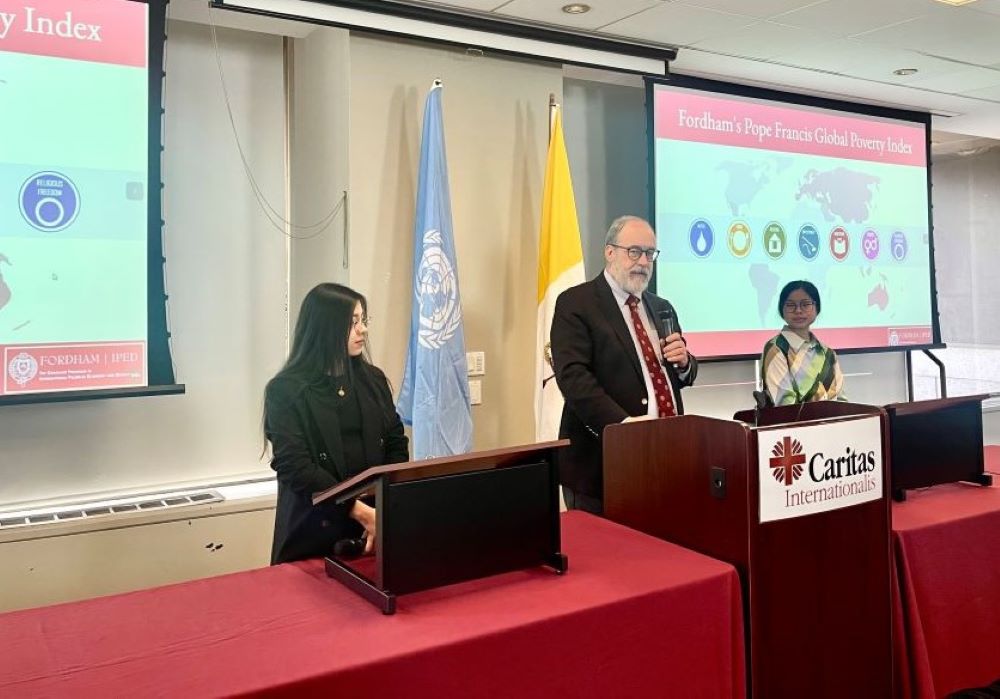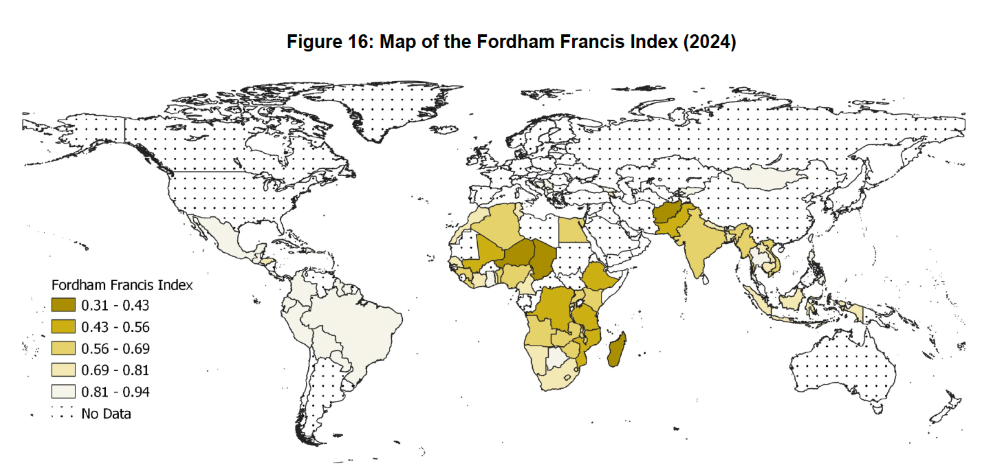
A report issued during a United Nations event for World Day of the Poor shows that efforts to alleviate global poverty have slowed.
The annual Pope Francis Global Poverty Report released by Jesuit-run Fordham University in New York Nov. 15 reveals that after a brief recovery from the pandemic, significant challenges remain in critical areas such as food security, housing and religious freedoms.
The global poverty score stands at 25.8% — virtually unchanged from the previous year. In regions that include sub-Saharan Africa, Afghanistan, Haiti and Venezuela, access to basic needs remains severely limited. Spiritual freedoms are most restricted in areas across Asia and North Africa, the report found.
"The main result of this year's report is that the recovery from the pandemic that we observed last year in reducing the global poverty gap may have stalled," Henry Schwalbenberg said at the U.N. event announcing the report. Schwalbenberg, an economics and development professor at Fordham University, and his research assistants, led this year's report.
The report highlights the Fordham Francis Index — an annual measure that approaches global poverty by assessing material needs and spiritual needs. Inspired by Francis' vision of human dignity, the index tracks access to clean water, adequate food, safe housing and employment along with education, gender equity and religious freedom. It uses the most recent available data from multiple reliable international organizations.

This map highlights the geographical distribution of the Fordham Francis Index scores across the sample of 71 countries. The lowest scores are largely concentrated in Africa and Asia. The global poverty score stands at 25.8%. (Courtesy of Fordham University)
While some areas have shown progress, such as access to clean drinking water and employment that pays above subsistence levels, others have stagnated or worsened, the report shows. In particular, access to adequate housing, basic education and gender equity showed no significant improvement, and worrying trends persist in food security and spiritual freedoms.
According to Ana Barragán, a Fulbright fellow from Mexico and a research assistant on the project, the data from the World Health Organization and UNICEF indicates a continuous decline in the number of people lacking access to clean drinking water. About 9% of the global population — about 700 million people — still lack basic access to clean water.
"Since 2017, the number of people suffering from undernourishment began to constantly increase," Genevieve Connell, who previously worked with the U.N.'s National Human Development Report for Mongolia, said in presenting data on food security. "Due to conflicts and climate change, many expect this trend to continue to worsen in the future."
In 2024, about 9% of the global population were unable to meet their dietary needs.
'Since 2017, the number of people suffering from undernourishment began to constantly increase.'
—Genevieve Connell
Based on data from the Oxford Poverty and Human Development Initiative, the report estimates that more than 1 billion people — or 17 % of the global population — live in inadequate housing. The report defines that as structures with dirt floors, missing roofs or walls made from improvised materials.
In addition, Connell said that nearly a quarter of the world's labor force — about 850 million people — remain in "distressed labor." That means they are either unemployed or earning less than $3.20 per day, a threshold the International Labor Organization defines as insufficient for sustaining a dignified life. Although there was some improvement following the pandemic, the recovery has slowed significantly, with minimal gains in recent years, the report showed.
The report also found patterns of decline in "spiritual freedoms," including access to education, gender equity and religious freedom.
Barragán also presented findings on education, specifically adult literacy rates, derived from UNESCO data. From 2013 to 2022, she said, illiteracy rates declined, and the latest data showed that 774 million adults remain fully illiterate. This barrier to education, particularly in low-income regions, limits opportunities for economic mobility and personal development, she said.
Advertisement
On the issue of gender equity, referencing the World Economic Forum's Health and Survival Index, Connell reported that since 2014, the health and survival disparities between men and women have worsened. With approximately half the world's women — about 2 billion people — facing severe health and survival risks due to gender discrimination, the index underscored the need for systemic changes to protect and promote women's rights globally.
Religious freedom has also experienced a decline. Barragán cited data from the Pew Research Center's Government Restrictions Index, showing a significant increase in restrictions on religious practice worldwide since 2017. "We estimate that more than half of the world's population, about 4 and a half billion people, live in countries where religious freedom is highly restricted," she said.
Schwalbenberg concluded the presentation by emphasizing the importance of viewing poverty through a lens that encompasses both material and spiritual needs. "Hopefully this stall in the recovery since the pandemic will be short-lived and we will observe improvements in the global poverty core in the near future," he said.








